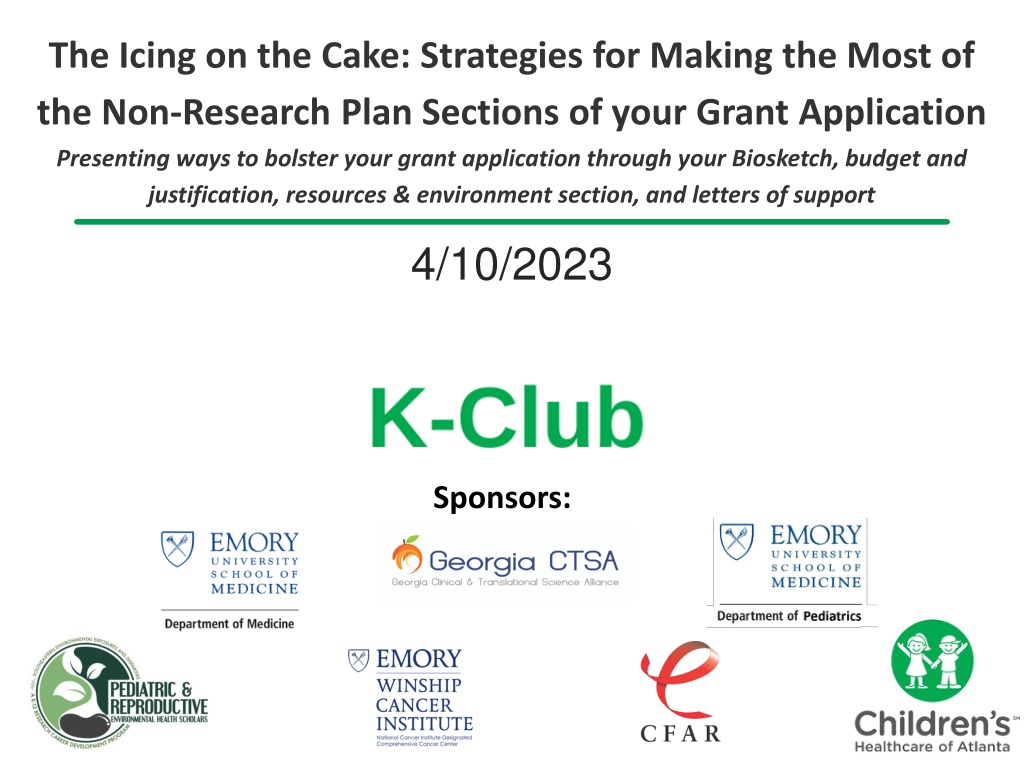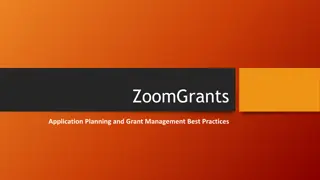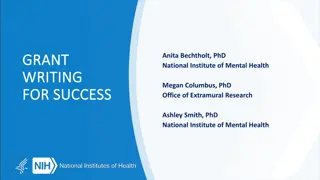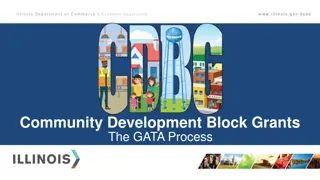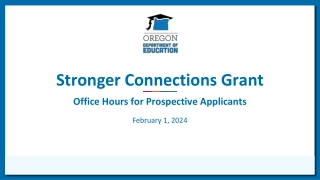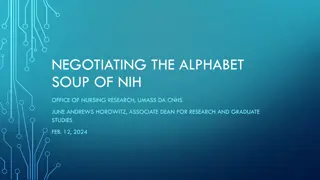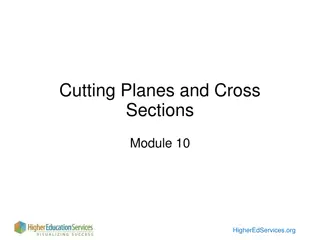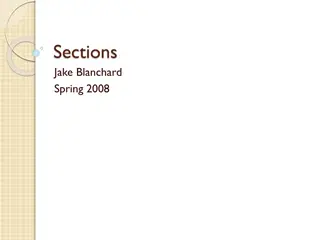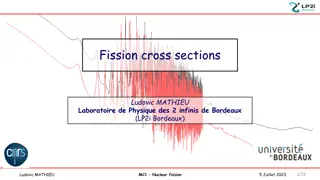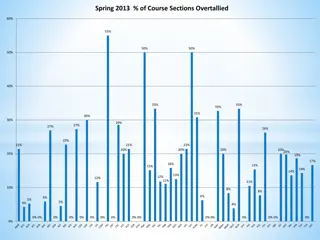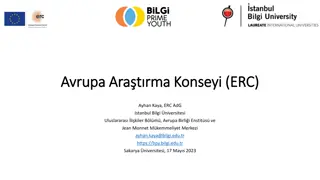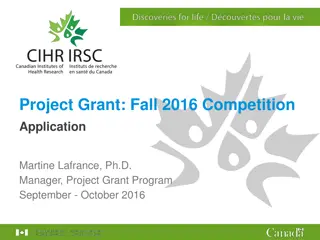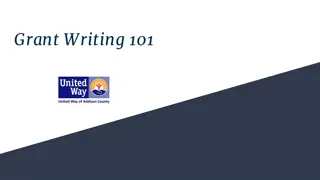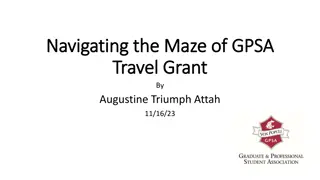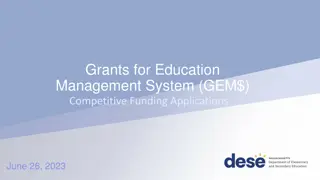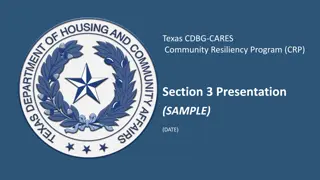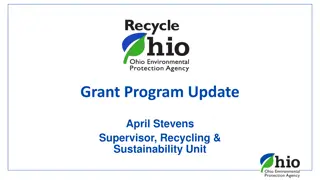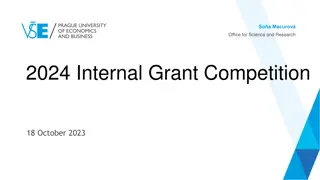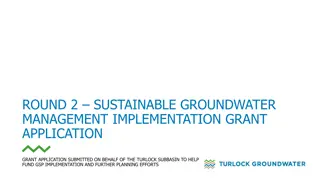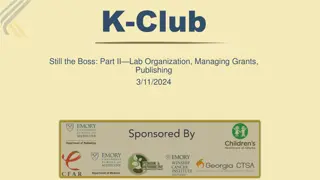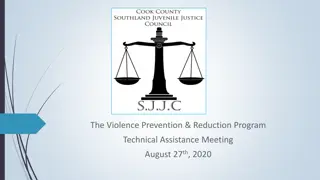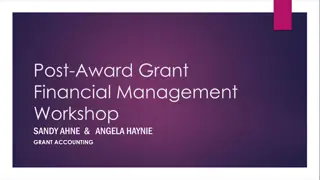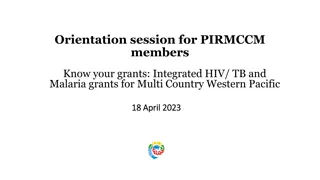Strategies to Enhance Non-Research Sections in Grant Applications
Explore ways to strengthen your grant application beyond the research plan. Learn how to optimize your Biosketch, budget, resources & environment section, and letters of support to increase your chances of success.
Download Presentation

Please find below an Image/Link to download the presentation.
The content on the website is provided AS IS for your information and personal use only. It may not be sold, licensed, or shared on other websites without obtaining consent from the author. Download presentation by click this link. If you encounter any issues during the download, it is possible that the publisher has removed the file from their server.
E N D
Presentation Transcript
The Icing on the Cake: Strategies for Making the Most of the Non-Research Plan Sections of your Grant Application Presenting ways to bolster your grant application through your Biosketch, budget and justification, resources & environment section, and letters of support 4/10/2023 Sponsors:
Survey Drawing Children s Healthcare of Atlanta | Emory University 2
Survey Drawing Winner: Lisa Daley-Bauer Children s Healthcare of Atlanta | Emory University 3
K-Club Special: Robert A. Winn Career Development Award (Winn CDA) This award program commits to the following goals: To train and develop 290 new clinical investigators dedicated to increasing diversity in clinical trials (~60/year) To provide immersive community-based experiences in clinical trial research to 60 underrepresented minority medical students participating in the Robert A. Winn Clinical Investigator Pathway Program (Winn CIPP) each summer. $120K/year for 2 years; requires at least 40% of the scholar s time (Note: Awards will be given to organizations, not to individuals.) Each scholar must be mentored by an experienced clinical investigator at an established clinical trial site and participate substantively in the mentor's active clinical trial (it is not expected that scholars will have their own clinical trials). Deadline: May 12, 2023 https://winnawards.smapply.io/prog/winncda/ Children s Healthcare of Atlanta | Emory University 4
K-Club Special: Alexs Lemonade Stand A Award Grant (Career Development Award) Purpose: to find cures and better treatments for childhood cancers by providing support to early career scientists who want to establish a career in pediatric oncology research. The ideal applicant has an original project that is not currently being funded. Demonstration of a future commitment to pediatric cancer investigation as well as institutional support for the career development of the investigator are critical components of a successful application. A mentor is required, and a career development plan must be included. A minimum of 75% of the applicant s time during the A Award period must be allocated as protected time for all research activities. $800,000 over 4 years; no indirect costs allowed Deadline: May 12, 2023 https://www.alexslemonade.org/sites/default/files/images/alsf1/downloads/2023_a_award_grant_gui delines.pdf Children s Healthcare of Atlanta | Emory University 5
Todays experts Letters of Support Amelia C Randall, MBA Director Finance Emory Department of Pediatrics Budget Kim Caroline & Milagros Benitez RAS/Dept of Pediatrics Emory University Biosketches Julie Hawk, PhD Grant Proposal Development Associate Department of Pediatrics Emory University Budget Justification Sunil Raikar, MD Assistant Professor, Pediatric Hematology/Oncology Aflac Cancer & Blood Disorders Center Children's Healthcare of Atlanta - Emory University Resources and Environment Erica Pitre Director of Research Development Office of Research Development at Emory University Children s Healthcare of Atlanta | Emory University 6
Budgets Kim Caroline & Milagros Benitez RAS/Dept of Pediatrics Emory University
Budgetary Elements Salary for Principal Investigator Varies by Institute; generally up to $100,000 plus fringe benefits per year can be budgeted Salary Cost Sharing: Requiredwhen institutional salary is above the federal salary cap (currently $212,100). Research Support for Program-related Expenses Varies by Institute; generally $25,000 to $50,000 per year can be budgeted Allowable program-related expenses: tuition and fees related to career development research-related expenses, such as supplies, equipment and technical personnel travel to research meetings or training statistical services including personnel and computer time Non-Salary Cost Sharing: Not required Inclusion of voluntary cost sharing in the proposal is not recommended as it becomes mandatory in the award. Voluntary cost sharing is not considered during the merit review process; and has no impact on the proposal s review. Children s Healthcare of Atlanta | Emory University Indirect Costs: 8% of direct costs
Internal Budget Example Internal Budget Example Year 1 Year 1 Institutional Base Current Annual Year 1 9/1/2023 Fringe Benefits - 8/31/2024 Cal Salary Request Personnel Role Salary Salary % Effort Fringe Total Months A. Senior/Key Mary Smith PD/PI 238,000 212,100 75.0% 9.00 31.8% 100,000 31,800 131,800 Subtotal Senior/Key 100,000 31,800 131,800 Subtotal Personnel 100,000 31,800 131,800 C. Other Direct Costs Research Support Vouchers EEG tech 25,000 3,000 22,000 Subtotal Other Direct Costs 25,000 Total Direct Costs MTDC Base F&A Rate Indirect Cost $ 156,800 $ 156,800 8.00% $ 12,544 Total DIRECT & INDIRECT 9 $ 169,344
Budget Justifications Sunil Raikar, MD Assistant Professor, Pediatric Hematology/Oncology Aflac Cancer & Blood Disorders Center Children's Healthcare of Atlanta - Emory University
Budget Justification Components Personnel Description of team members Research support Supplies and other costs ($25K - $50K) Other support Costs not covered by the K grant Children s Healthcare of Atlanta | Emory University
Personnel Use this section to highlight and reiterate expertise of all team members Principal Investigator 75% effort Mentor(s) no effort Co-I or significant collaborators (no effort) Lab technician or research coordinator (can include effort taken from research costs) Use 3-4 sentences to describe each personnel Include their title/expertise, describe their specific role on the project. Children s Healthcare of Atlanta | Emory University
Personnel Sunil S. Raikar, MD (PI) (9 calendar months) is currently an Assistant Professor in the Department of Pediatrics and Division of Hematology/Oncology/BMT at Emory University. He will be responsible for performing the experiments outlined in the research proposal under the mentorship of H. Trent Spencer, PhD, Edmund K. Waller, MD. PhD and Douglas K. Graham, MD, PhD. He will analyze and interpret the data generated by this project as well as prepare the manuscripts for this research project. The mentorship team will be involved with experimental design, troubleshooting, analysis of data, and manuscript preparation. He is requesting 9 months of salary support and fringe. He is committing 75% effort to this project and his research career development. H. Trent Spencer, PhD, will serve as the primary mentor to Dr. Raikar for this project. He is an Associate Professor in the Department of Pediatrics and Director of the Cell and Gene Therapy Program in the Aflac Cancer and Blood Disorders Center. As the primary mentor, he will provide guidance in generation of hypotheses, experiment design and execution, data analysis, manuscript and grant writing, as well as career development support. He has sufficient independent support to cover costs in excess of the allowable budget of this award. No salary support is requested. Children s Healthcare of Atlanta | Emory University
Research Support $25K -$50K depending upon funding institute Per NIH, these funds may be used for the following expenses: (a) tuition and fees related to career development (b) research-related expenses, such as supplies, equipment and technical personnel (c) travel to research meetings or training (d) statistical services including personnel and computer time. Children s Healthcare of Atlanta | Emory University
Research Support A. Supplies Dr. Raikar is requesting $30,000 per year be allocated towards laboratory supplies to perform experiments as outlined in the specific aims of this proposal. The cost breakdown for supplies is as follows: Tissue culture supplies - plates, media, cell counting supplies, flow analysis supplies - $8,000 Vector production supplies - DNA plasmid kits, transfection reagents, vector titering supplies - $7,000 Molecular therapy supplies - gels, restriction enzymes, DNA purification kits, real time PCR reagents, western blotting reagents, ELISA kits, Luminex assay kits - $10,000 RNA sequencing costs - $5,000 B. Animal Costs Mice will be housed in the animal facility located in the Emory Children s Center building. The candidate is requesting $13,000 per year to be allocated for costs of breeding, housing and experimentation with mice. C. Tuition and Fees The candidate is requesting $3,000 per year to help cover costs of tuition and fees of courses and seminars listed in the training plan. D. Travel The candidate anticipates attending two national scientific meetings per year to present research findings. He is requesting $3,000 per year to cover meeting registration, travel, and lodging costs. E. Publications The candidate requests $1000 per year to assist in publication costs for posters and manuscripts resulting from the proposed research. Children s Healthcare of Atlanta | Emory University
Other Support Describe how research costs will be covered K is mainly a career development grant $25K-$50K will not cover entire research costs Highlight support from mentor, as well as divisional and institutional support Extremely important to include for all K grants Children s Healthcare of Atlanta | Emory University
Other Support The proposed research plan and career development plan will receive the following additional support: Salary and fringe for the candidate exceeding the allowed budget will be covered by Divisional funds The cost of laboratory materials and supplies of the proposed project that exceeds the allowable budget of this award will be supported by the research mentors Equipment use will be fully supported by the research mentors Travel costs to meetings in excess of what is requested will be shared by TDJ (travel, dues and journals) stipends provided by the Department of Pediatrics Additional poster publication costs for scientific meetings will be covered by Divisional funds The candidate will also have access to the Emory University Courtesy scholarship, which will pay for five credits per semester of his didactic coursework Children s Healthcare of Atlanta | Emory University
Letters of Support Amelia Randall, MBA Director Finance, Department of Pediatrics
Letters of Support Things to Consider: Commitment of Resources Access to key techniques, facilities, equipment, animal lines, unique reagents etc. that are key to the project Support for your project from key organizations, stakeholders Collaborations or commitments that might make you stand out What is the RFA asking you for? 19
Letters of Support School of Medicine/University May include commitment of resources Department Chair May include commitment of resources, protected time Mentor(s) May include commitment to train on a particular technique or method, commitment of resources 20
Letters of Support Collaborators May include commitment of resources, access to equipment, animal lines, specific facilities etc. Community Partners, Stakeholders May include commitment of or access to key resources RFA Specific Letters ALWAYS READ THE RFA CAREFULLY! 21
RFA Specific Letters Example (K23) https://grants.nih.gov/grants/guide/pa-files/PA-20-205.html (K23 Parent) Letters of Support from Collaborators, Contributors and Consultants Signed statements must be provided by all collaborators and/or consultants confirming their participation in the project and describing their specific roles. Collaborators and consultants do not need to provide their biographical sketches unless also listed as senior/key personnel. However, information should be provided clearly documenting the appropriate expertise in the proposed areas of consulting/collaboration. Advisory committee members (if applicable): Signed statements must be provided by each member of the proposed advisory committee. These statements should confirm their participation, describe their specific roles, and document the expertise they will contribute. Unless also listed as senior/key personnel, these individuals do not need to provide their biographical sketches. 22
RFA Specific Letters Example (K23) Institutional Commitment to the Candidate s Research Career Development The sponsoring institution must provide a statement of commitment to the candidate's development into a productive, independent investigator and to meeting the requirements of this award. It should be clear that the institutional commitment to the candidate is not contingent upon receipt of this career award. Provide assurances that the candidate will be able to devote the required effort to activities under this award. The remaining effort should be devoted to activities related to the development of the candidate s career as an independent scientist. Provide assurances that the candidate will have access to appropriate office and laboratory space, equipment, and other resources and facilities (including access to clinical and/or other research populations) to carry out the proposed research plan. Provide assurance that appropriate time and support will be available for any proposed mentor(s) and/or other staff consistent with the career development plan. Candidates who will be using the resources within a Clinical and Translational Science Award (CTSA) during the course of the award are requested to include a letter of agreement from PD/PI of the the CTSA program as part of the application. 23
Biosketches Julie Hawk, PhD Grant Proposal Development Associate Department of Pediatrics Emory University
Biosketch: High Points for Today Personal Statement: Should be specific to the grant For a career development award, speak to both the research and the career path For a career development award, discuss prior work with your mentor if applicable Contributions to Science: Privilege quality over quantity Highlight contributions that tie into the grant for which you are applying 25
Example from a K23 Personal Statement I am convinced that microchip-based technologies have the potential to transform clinical practice. However, there are significant challenges associated with translating microchip-based systems from the cleanroom to the clinic. I have already made significant scientific contributions when working at the interface of hematology and microsystems, and the current research builds upon this experience. The additional training in clinical research proposed in this plan will enable me to design novel medical microsystems and independently translate these systems to the bedside. In addition, my selected mentoring team has a record of accomplishment in both NIH funding and successful mentorship. 26 Thanks to Dr. David Myers for sharing his biosketch.
Example from a K23 Contribution to Science 1. High-throughput clinical contraction cytometer linking bleeding to platelet force: While it was known that the biophysics of cells correlates with their physiological function, little was known about correlations between cellular force and clinical conditions. This was primarily due to a lack of tools that were capable of measuring the applied forces of large numbers of individual cells. Building on my aforementioned expertise and contributions in micromechanical design and combining it with additional training in hematology, I was able to contribute two main findings. First, I designed a new contraction cytometer that measured the contractile force of up to one-thousand cells in each experiment. Second, I used this contraction cytometer to show that reduced platelet contractile force was linked to undiagnosed bleeding disorders... 27 Thanks to Dr. David Myers for sharing his biosketch.
Resources and Environment Erica Pitre Director of Research Development Office of Research Development Emory University
